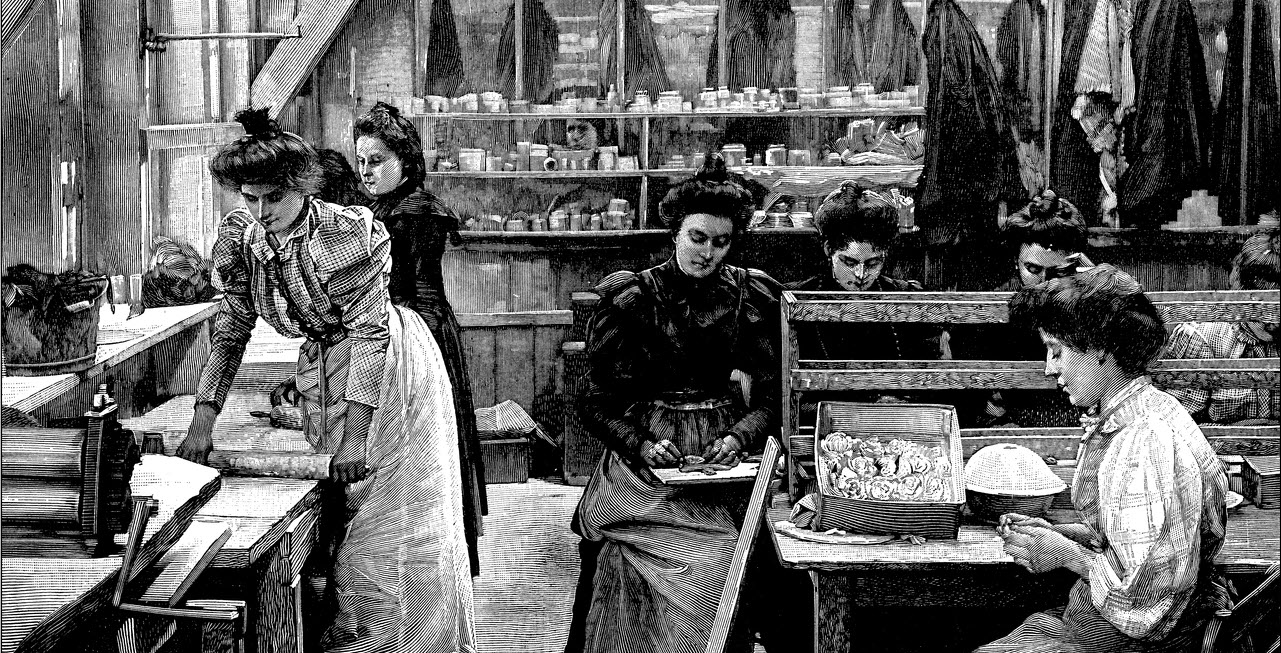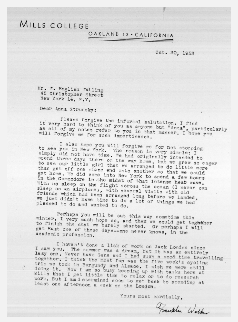| By Lucy Dow, Associate Acquisitions Editor at Gale, part of Cengage Group |
Among perhaps the lesser-known contributions of women in the early twentieth century was their critical role in advancing the labor movement in North America, fighting for issues such as wage equality, employee benefits, and workplace safety. These concerns resonate in our own time, from the U.S. women’s soccer team’s fight for equal pay to the pushback against unionization among Starbucks and Amazon employees.
The new Gale Primary Sources collection Political Extremism and Radicalism: Global Communist and Socialist Movements is an invaluable resource for shedding light on the involvement of women in early labor movements. This collection of materials from source libraries at Yale University, Harvard University, the British Library, and the Federal Bureau of Investigation, among others, includes correspondence, manuscripts, and personal papers relating to communist and socialist thinkers and activists from the late 1800s through the twentieth century.
The collection includes rare insights into the roles that prominent activists such as Rose Pastor Stokes and Anna Strunsky Walling played in fighting for workers’ rights in America.
Rose Pastor Stokes: An Early Labor Activist and Reproductive Rights Advocate
Rose Pastor Stokes (1879–1933), born Rose Harriet Wieslander, was a writer, feminist, and birth control advocate who was aligned with the Socialist movement and the American Communist Party. She emigrated from what is now Poland to the United States in 1890 and worked in a Cleveland cigar factory from age 12 to 23 while she educated herself at night. It was this experience of working 14-hour days that shaped her progressive sensibilities.
In 1903, she moved to New York City and became a writer for the Jewish Daily News. After interviewing the young Episcopalian millionaire socialist James Graham Phelps Stokes for a feature story, she and Stokes began a romance that culminated in their marriage.
Pastor Stokes was a passionate advocate for the working class. She helped organize support for the landmark 1909 garment workers’ strike by nearly 20,000, mostly Jewish, women. This strike, as well as the Triangle Shirtwaist Company fire in 1911, were pivotal events in America’s labor movement; they helped call attention to the dire need for workplace safety reforms. Her activism within New York City’s Lower East Side earned her the nickname “Rose of the Ghetto.” The issue of workplace safety has parallels today with the planned railway workers’ strike and efforts by railway companies to avoid safety regulations, among whose effects are presumed to be the large number of freight train derailments, such as the one in East Palestine, Ohio, earlier this year.
Pastor Stokes was also among the most vocal early supporters of women’s access to birth control. In 1916, she chaired a fundraiser in support of Margaret Sanger, who was facing trial for violating the Comstock Act, which banned the dissemination of birth control information. Soon after that, Pastor Stokes spoke at a birth control rally at Carnegie Hall, which incited a near riot. Although she later described an expectation that she would be arrested for her actions, she was not—perhaps because of her elevated social position.
Nonetheless, this event proved embarrassing for her family, and her father-in-law, real estate magnate and philanthropist Anson Phelps Stokes, urged Pastor Stokes to apologize, which she refused to do. Pastor Stokes and her husband grew increasingly estranged over her outspoken positions, and they divorced in 1925. She married Jerome Isaac Romaine, a Communist activist, in 1927, and died in Germany in 1933 while undergoing treatment for cancer.
Pastor Stokes’s papers are collected at the Yale University Library, and they appear in the new Gale collection. They include a letter she wrote to her father-in-law defending her actions at Carnegie Hall:
“I did what I did in the way I did it because I believed, as I still do, that the publicity attendant upon the act would cause a country-wide discussion of the problem . . . and make millions of women, unaware heretofore, aware of the existence of such a thing as Birth Control,” she wrote. “Although I believe the crying needs of the people to be a higher law than any on our statute books, I also believe that for breaking the latter I should have been arrested and imprisoned, as others have been. I expected the authorities to enforce the law. . . . I meant the authorities to enforce it. I gave them their opportunity. I wanted the fact that this law was vicious driven home to the people through its enforcement in my case, at least. And I considered such a result worth going to prison for.”
The correspondence with her father-in-law and the other primary source materials in the collection provide a wealth of material for classroom conversations. For instance, educators might draw comparisons between the fight for birth control in the early twentieth century and the conflict over abortion laws now, and how both are human rights as well as economic issues. Educators could also use Pastor Stokes’s words to spark a discussion about whether it’s ever appropriate to break the law, and whether there are “higher laws” than government statutes. They could ask students for other examples of historical figures who’ve defied the law to call attention to the need for societal changes.
Anna Strunsky Walling: Influential Journalist, Novelist, and Progressive Movement Leader
Anna Strunsky Walling (1877–1964) was an author, journalist, lecturer, and advocate of socialism and labor causes. She was born in what is now Belarus and emigrated to the United States in 1893. While she was a student at Stanford University, she became active in socialist causes and joined the Socialist Labor Party. She befriended writer Jack London while at Stanford, during her time as a member of a group of San Francisco radicals called “the Crowd.” Strunksy and London cowrote an epistolary (in the form of a series of letters) novel on the nature of love, The Kempton-Wace Letters.
In 1906, Strunsky and her sister Rose joined American socialist William English Walling in Russia as correspondents reporting on the failed revolution of 1905. Anna and William married that year in Paris in a ceremony attended by Jean Longuet, the grandson of Karl Marx, and then returned to the United States, settling in New York City. Together they traveled and reported on the 1908 race riot in Springfield, Illinois, and called for efforts to deal with racial discrimination in the North. William Walling was among the cofounders of the National Association for the Advancement of Colored People (NAACP) in 1909. The couple had four children together before separating a decade later.
In 1915, Strunsky Walling published her second novel, Violette of Père Lachaise. It’s the story of a young flower seller who becomes an actor involved in social revolution. Strunsky Walling continued to write and speak about the labor movement and other progressive causes for several decades, until her death in 1964.
Strunsky Walling’s letters are also archived at the Yale University Library and appear in the new Gale collection. They include a letter from Upton Sinclair, asking if Strunsky Walling knows of anyone who would be interested in reprinting his novels dealing with labor problems in the United States. There is also correspondence with Jack London, Rose Pastor Stokes, Emma Goldman, and other prominent writers and political activists from the period.
An Unfiltered Look at History
When students use primary sources, they gain a firsthand, and often personal, glimpse into the lives of the people who have helped shape history.
Gale’s Political Extremism and Radicalism archive won the 2022 SIIA CODiE award for Best Library Reference or Educational Database and the Platinum Award at the 2022 Modern Library Awards. This third collection expands its range to cover the events and thinkers of the Far Left in the twentieth century.
As educators in North America observe Women’s History Month by recognizing the contributions of women to our society, Political Extremism and Radicalism: Global Communist and Socialist Movements offers an abundant trove of eyewitness accounts that can help researchers and students better understand the vital role that women such as Rose Pastor Stokes and Anna Strunsky Walling played in the North American labor movement.
In the process, students will also gain a deeper understanding of what life was like for women during the early part of the twentieth century—and how the actions and achievements of these pioneers paved the way for life as we know it today.
To learn more about socialist, communist, and Far-Left political movements in the twentieth century, please fill out our form.
 About the Author
About the Author
Lucy Dow is an associate acquisitions editor at Gale, part of Cengage Group. This allows her to indulge her passion for historical primary sources of all kinds. She previously studied eighteenth- and nineteenth-century British history.



